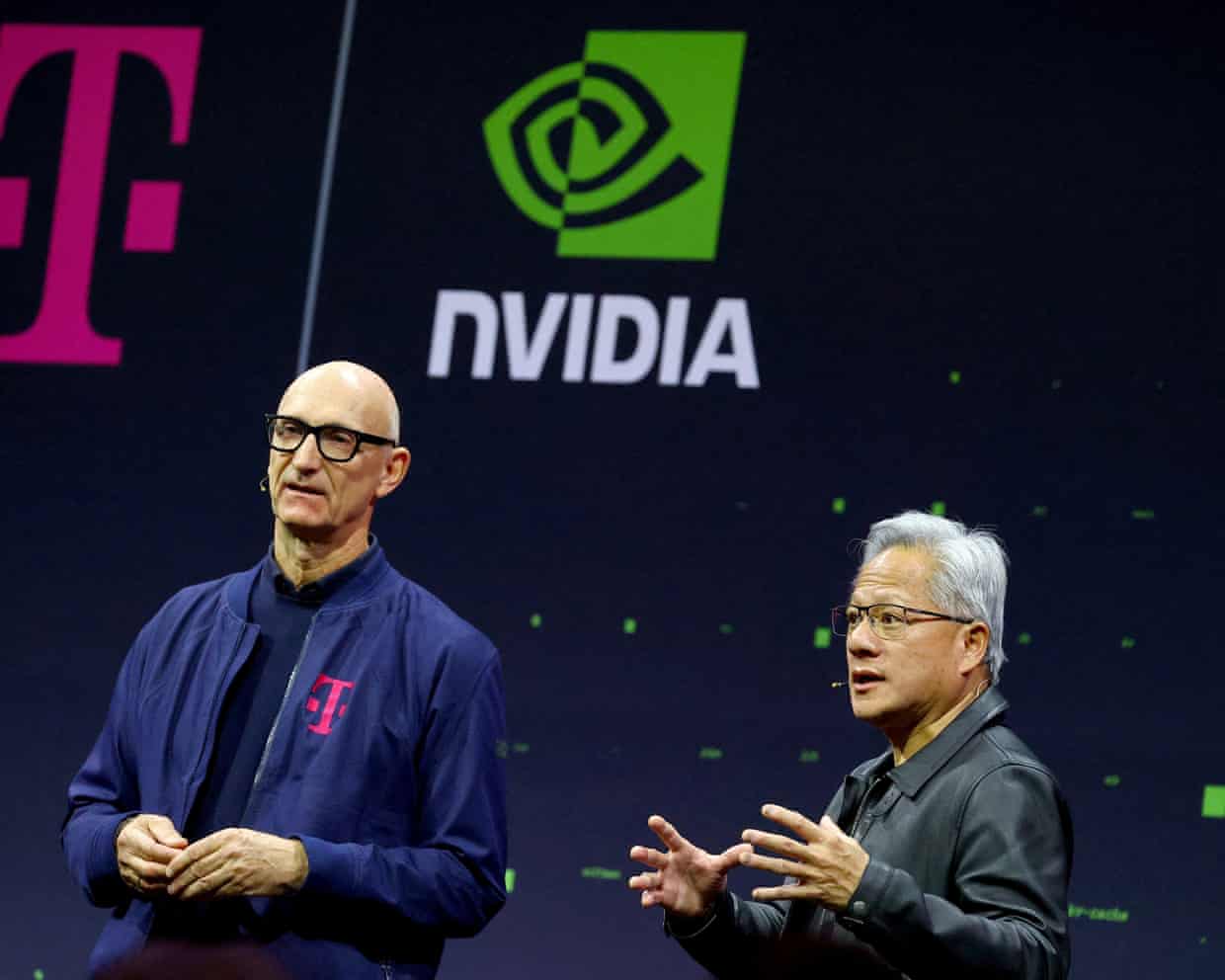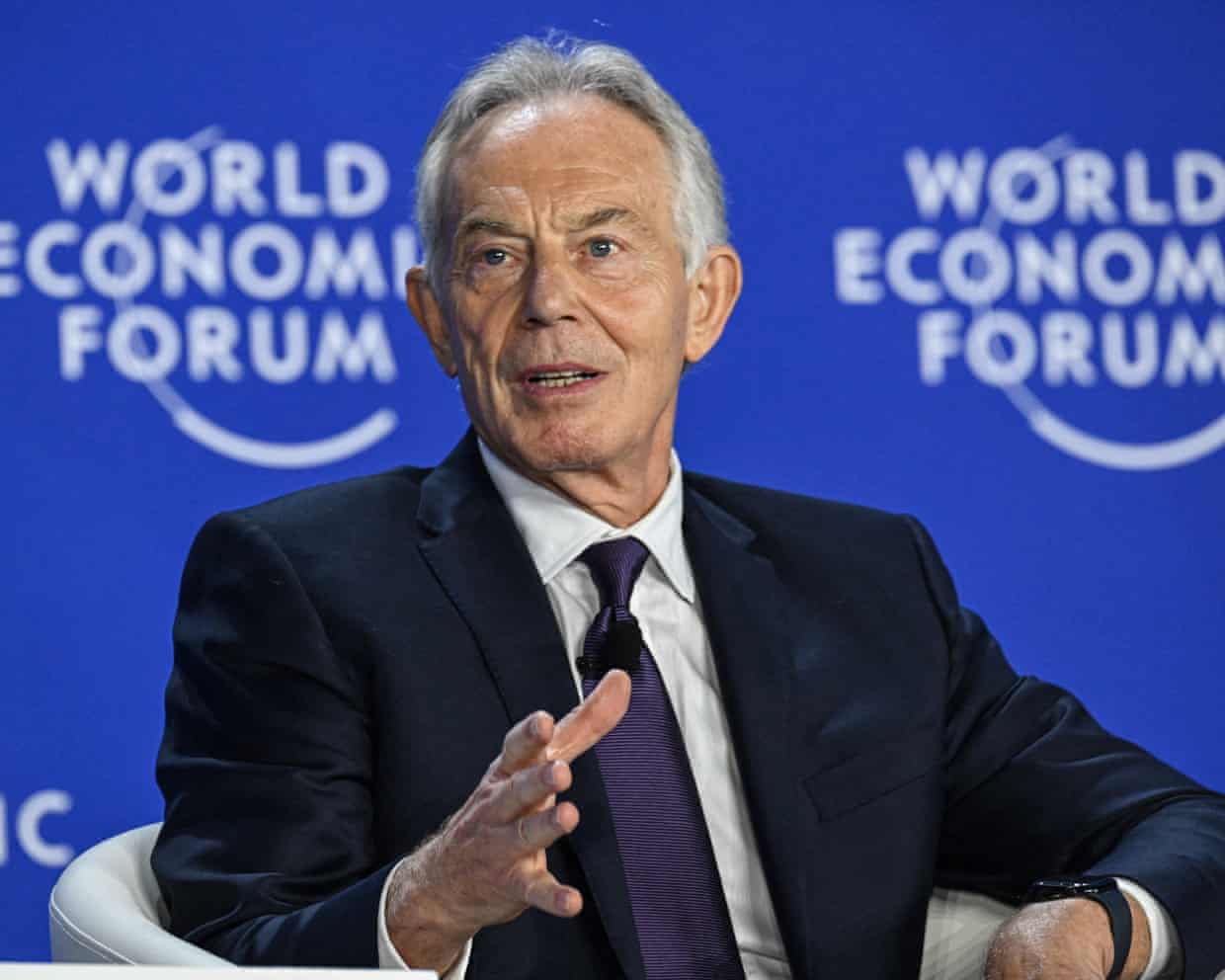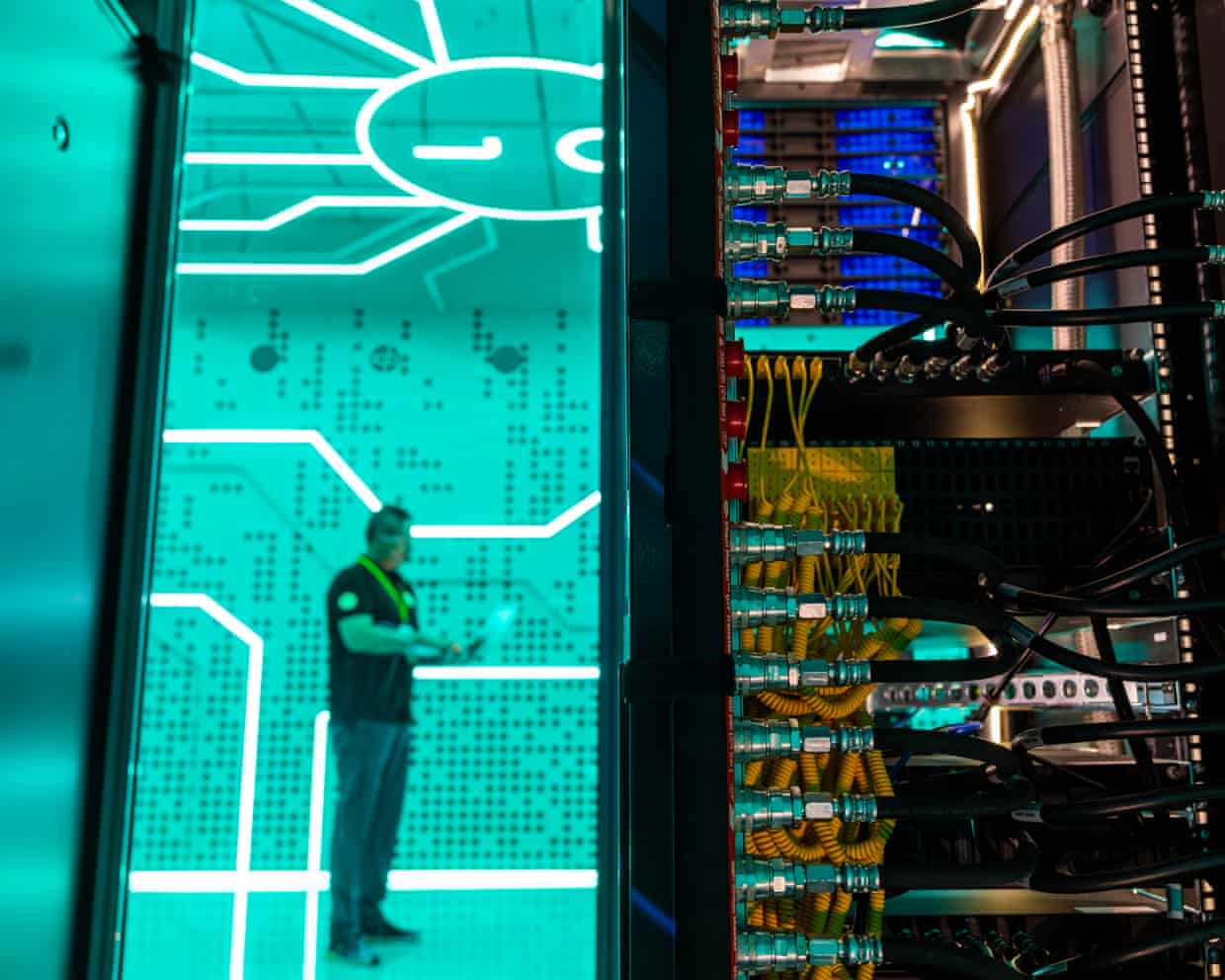European markets down and Asian chipmakers tumble in global stock sell-off amid worries over AI bubble – business live

Jim Reid, analyst at Deutsche Bank, said there is talk of whether we are “on the verge of an equity correction”.The last 24 hours have brought a clear risk-off move, as concerns over lofty tech valuations have hit investor sentiment.Markets compounded these losses in the early hours of Asian trading but have been rallying back in the couple of hours prior to going to print with US futures clawing back towards flat with the Kospi rallying back a couple of percentage points from early -5% plus losses.On Wall Street yesterday, the S&P 500 closed down 1.17%, losing ground because of sharp losses among tech stocks, and there was a big slump for Palantir (-7.
94%) after its earnings the previous day,Reid added:Whilst the moves were only one day’s selloff, the market narrative saw a discernible shift, with a growing chorus discussing whether we might be on the verge of an equity correction,That speculation has gathered pace over the last month in particular, mainly because the Magnificent 7 has diverged from the rest of the S&P 500, which has revived questions about how concentrated this equity market now is,Indeed, whilst the Mag 7 have been advancing in recent weeks, the equal-weighted S&P 500 actually fell in October for the first time in 6 months,Yesterday’s decline for Palantir (-7.
94%) was seen as emblematic of this shift, particularly given they’d actually raised their revenue outlook the previous day.But given their share price had quadrupled in the last year, that’s set the bar incredibly high for any earnings releases.In fact, the Magnificent 7 (-2.28%) led the declines yesterday, with Nvidia itself down by a larger -3.96% as some of those top-performing stocks came under scrutiny.
On the AI theme….Google is hatching plans to put artificial intelligence datacentres into space, with its first trial equipment sent into orbit in early 2027.Its scientists and engineers believe tightly packed constellations of about 80 solar-powered satellites could be arranged in orbit about 400 miles above the Earth’s surface equipped with the powerful processors required to meet rising demand for AI.Prices of space launches are falling so quickly that by the middle of the 2030s the running costs of a space-based datacentre could be comparable to one on Earth, according to Google research released on Tuesday.Using satellites could also minimise the impact on the land and water resources needed to cool existing datacentres.
Our main story today:Global stock markets have fallen sharply amid concerns that a boom in valuations of artificial intelligence (AI) companies could be rapidly cooling.Markets in the US, Asia and Europe have fallen after bank bosses warned a serious stock market correction could be ahead, after a run of record stock market highs led some companies to appear overvalued.In the US the tech-focused Nasdaq and the S&P 500 suffered their largest one-day percentage drop in almost a month on Tuesday.Technology shares pulled the Nasdaq lower, which resulted in it closing 2% down.Meanwhile, there were one-day falls for all of the “magnificent seven” AI-related stocks: including the chipmaker Nvidia, Amazon, Apple, Microsoft, Tesla, Google owner Alphabet and Meta, the owner of Facebook, Instagram and WhatsApp.
The government takes its manifesto promises “seriously,” but needs to tackle “big challenges in the economy,” UK cabinet minister Bridget Phillipson said amid speculation that the chancellor Rachel Reeves will rip up Labour’s tax promises.Phillipson, the education secretary, told the BBC:Where it comes to our manifesto, of course, we take the commitments we made seriously.And as the Chancellor was saying yesterday, we know that there are some big challenges in the economy.We’ve made lots of changes already that are putting things on a more stable footing.That’s why we’ve seen interest rate cuts, we’ve seen growth being the fastest in the G7 in the first half of the year.
But there are some big global factors that remain a challenge, and that’s why we will do what’s what’s right, what’s necessary, both for the public but also for the long-term future of our economy.She added that the Office for Budget Responsibility’s latest calculations will showthe damage of the chaotic Brexit we saw, the damage of years and years of austerity was even more serious than we anticipated”.Unfortunately, that is causing major problems in terms of our economy and that’s where we are at the moment, I’m afraid to say.The UK pub chain JD Wetherspoon has reported higher sales but expressed caution ahead of the 26 November budget, after recent government policy changes pushed its costs higher.The group, which runs nearly 800 pubs across the UK, said like-for-like sales rose by 3.
7% year on year in the 14 weeks to 2 November.Bar sales climbed by 5.7%, food edged 0.9% higher, and sales from slot and fruit machines jumped by 8.9%, while hotel room sales fell by 6.
3%,Sir Tim Martin, the chairman, said:The company is pleased with the continued sales momentum but is mindful of the chancellor’s budget statement later this month and, as a result, is slightly more cautious in its outlook for the remainder of the year,In a speech yesterday, the UK chancellor Rachel Reeves dropped a strong hint of an income tax increase in the budget, warning everyone will “have to contribute” to helping rebuild the economy and repair the country’s finances,Martin said Wetherspoon had seen a surge in staff costs following recent policy changes, which is “dramatically widening the pricing differential between pubs and supermarkets, to the anger and consternation of customers”,A 10% wage rise will increase the cost of a pint by about 15p in a pub compared with about 1.
5p per pint in a supermarket, he said.Wetherspoon employs nearly 42,100 people across its pubs and head office.Martin previously said that increases to employers’ national insurance contributions and wages are adding about £60m to the chain’s yearly costs, while it also faces an impact from energy charges and new packaging taxes.Drax power station, which creates so-called “clean” energy by burning wood pellets, some of which are shipped from the United States, has signed a new subsidies deal with the government.The biomass plant in North Yorkshire has agreed a price from 2027-31 of £109.
9/MWh in 2012 prices (£164 in today’s money), with an agreement that it will reduce the amount of power it produces annually.The strike price means that Drax is paid that amount no matter the wholesale price of electricity, meaning consumers pay the difference on their bills if the wholesale price is lower than the strike price.The previous strike price up to 2027 was £100/MWh, but the government will pay less in the years ahead because the facility has agreed to burn less wood.There have long been criticisms of this power station as it has been linked to the burning of ancient woodland, and burning wood creates pollution and emissions.However, removing it from the grid would be problematic for government because it produces a lot of electricity.
Recent research has found that Drax is the UK’s largest emitter.Emissions from Drax power station were larger than the six largest gas power plants combined in 2024.Josie Murdoch, analyst at Ember said:Although this new deal means Drax generation and subsidies will fall, the deal will still see substantial subsidies handed out to Drax every day, all while Drax remains the largest emitting power station in the UK.Water company bosses were blocked from receiving £4m in bonuses for the last financial year – and the industry regulator is considering forcing companies to report pay received by parent companies following a Guardian investigation.Ofwat, the regulator for English and Welsh water firms, said six companies had complied with the new rules governing the sector and did not pay out bonuses to bosses.
However, it is consulting on further rules to force the disclosure of payments by other companies after the revelation that Yorkshire Water’s chief executive, Nicola Shaw, had received £1,3m in secret payments via an offshore parent company,The government in June banned bonuses for water companies that failed to protect the environment from the worst pollution incidents, after widespread public outrage over the extent of sewage in Britain’s rivers and seas,The six companies whose bonuses were banned this year were Anglian Water, Southern Water, Thames Water, United Utilities, Wessex Water and Yorkshire Water, all of which did not give their directors an annual bonus and other relevant performance-related pay, according to Ofwat’s definitions,Despite the ban and the significant scrutiny on the sector, Guardian analysis found that the pay of water company chief executives in England and Wales rose by 5% in the last financial year to an average of £1.
1m – although the pay awarded to the bosses of the six companies did fall.There were outliers even among the six: the £1.3m given to Shaw was only disclosed after the Guardian raised questions about the lack of transparency.The maker of the blockbuster Ozempic and Wegovy jabs has cut its sales and profit forecasts again, as it continues to fall behind in the competitive market for obesity and diabetes treatments, losing ground to US rival Eli Lilly, the maker of Mounjaro and Zepbound.Novo Nordisk’s chief executive, Mike Doustdar, who took the reins in August, said the reduced guidance was because of “the lower growth expectations for our GLP-1 treatments”.
“The market is more competitive than ever more,” Doustdar said in a video message accompanying the company’s third-quarter results.The Danish pharmaceutical firm’s rate of profit growth has slowed and its share price has slid after losing ground to Eli Lilly.Clinical studies have shown that Mounjaro is more effective in causing weight loss than Wegovy.Marks & Spencer boss Stuart Machin said Rachel Reeves’ speech yesterday has only made his customers more worried about rising taxes, as he called on the chancellor not to slap “more taxes on everyday economy, that wouldn’t be a growth strategy”.Speaking to journalists after the retailer reported a halving in half-year profits, Machin expressed frustration about the delayed budget, saying “we are all waiting for the 26th” with “planning for the worst with the budget and hoping for the best”.
The chancellor will present her budget on 26 November, a month later than usual.In a speech yesterday, she refused to rule out tax rises, insisting she must “deal with the world as I find it, not the world as I might wish it to be”.Reeves foreshadowed an income tax increase, a breach of Labour’s manifesto commitment, as a result of the public finances being in a worse state than expected after “years of economic mismanagement”.Machin said clothing is having a tough time – partly because of ongoing issues related to the cyber-attack in April, which hit M&S sales hard, but also the warm autumn.The Financial Conduct Authority has extended its consultation on the £11bn compensation scheme over the loan scandal, in a move that notably pushes the deadline onto the other side of the UK’s crucial autumn budget.
It comes after lenders and consumer groups said they needed more time to analyse extensive market data, with the main consultation paper alone running more than 300 pages long.The deadline has now been pushed from 18 November to 12 December.While an extended deadline might not sound exciting on its own, it could end up providing a bargaining chip for banks like Lloyds, Barclays and Santander UK, as the Treasury considers whether to hike taxes on the banking sector in order to strengthen the public finances.Last week, banking analyst John Cronin of Seapoint Insights, wrote:If the Treasury’s consultation in a motor finance redress scheme context is extended, this may well give the Chancellor pause for thought before lashing more taxes onto the sector.He added:Indeed, it might suit the banks for the argument to be drawn out in a bank taxes context, because if the consultation is still open at the stage of the Budget, Reeves will be presumably in a bind as regards what to do.
The FCA said it still expects to publish final rules in early 2026, saying it will now be either February or March.Bitcoin dipped below $100,000 for the first time since June, but is now back up above that level.The world’s best-known cryptocurrency is currently trading 1.7% higher at $101,985.This is a long way from the $125,835.
92 record high hit in early October, when investors were piling into bitcoin, gold and government debt in what was dubbed the “debasement trade”.Following the sell-off in Asia, European stock indices have fallen more modestly.The FTSE 100 index in London has slipped by 0.1%, falling to 9,703.The Dax in Frankfurt and the Ibex in Madrid both lost nearly 0.
8% while the CAC in Paris and the FTSE MiB in Milan are both down by 0,3%,In Asia, Japan’s Nikkei index fell by 2,5% and South Korea’s Kospi lost 2,85%, following earlier heavier losses.
Shares in Japan’s Advantest Corporation, which supplies automatic test equipment to companies such as Nvidia, slumped by 6% while Taiwan Semiconductor Manufacturing Co fell by 3%.“Global equity markets faced a heavy selloff on Tuesday as a cumulation of several factors have led to a rise in uncertainty and risk aversion,” said Daniela Hathorn, senior market analyst at Capital.com.Today, Asia kicked off the session with another round of selling pressure but the majors have been able to claw back throughout the day, leading to a more stable open in Europe.With the market’s usual data feeds on pause due to the US government shutdown, investors are increasingly reliant on less predictable signals and commentary.
That vacuum has heightened sensitivity to policy communication and elevated fears about how long economic and earnings momentum can hold without fresh supporting evidence.The tech sector, which has been the key powerhouse behind the rally this year, was dragged down by a sharp selloff in Palantir after releasing its earnings, despite reporting a stellar quarter and improving its forward guidance.This momentum shows how investors are starting to question whether these lofty valuations need more than just good earnings to keep them going, leaving the wider equity space exposed to continued downside given the narrow breadth of the current market.Compounding this data gap is a growing concern that global economic growth may be softening, with a soft PMI reading in the US adding fuel to the fire.At a time when markets have continuously been breaking record highs, modest disappointments or ambiguous indications from macro or corporate fronts are enough to trigger outsized reactions.
The Federal Reserve’s unwillingness to commit to further rate cuts at last week’s meeting has been a clear example of that.Overall, the AI-investment boom that has fuelled the rally in 2025 has created exceptionally high expectations for continued earnings growth, but recent signs of cooling demand, rising costs, and tighter policy conditions have prompted investors to question whether those valuations are still justified.The Chinese government has issued guidance requiring new data centre projects that have received any state funds to only use domestically-made artificial intelligence chips, Reuters reported, citing two unnamed sources.In recent weeks, Chinese regulatory authorities have ordered data centres that are less than 30% complete to remove all installed foreign chips, and to cancel any plans to purchase them.Projects that are at a more advanced stage will be decided on a case-by-case basis.
It looks like one of China’s most aggressive steps yet to eliminate foreign technology from its critical infrastructure, and become self-sufficient in AI chips,It comes as trade tensions between Washington and Beijing, have eased, after a high-stakes meeting between the two presidents, Donald Trump and Xi Jinping, in South Korea last week,China’s access to advanced AI chips such as those made by US chipmaker Nvidia, has been a key source of friction with the US, as the two countries battle for dominance in high-end computing power and artificial intelligence,Other foreign chipmakers that sell data centre chips to China include AMD and Intel,Trump said on Sunday that Washington will “let them deal with Nvidia but not in terms of the most advanced” chips

Josh O’Connor: the shape-shifting star who became cinema’s most wanted
He came to prominence with his portrayal of Prince Charles in The Crown, and now it seems that Josh O’Connor might be primed for his own coronation.The British actor is in three major films between now and January – better known to film-lovers as awards season.He leads Kelly Reichardt’s art heist drama Mastermind, which opened in UK cinemas last week; stars opposite Paul Mescal in the period romance drama The History of Sound; and takes the central role in Wake Up Dead Man, Rian Johnson’s third instalment in the Knives Out mystery franchise.There’s also the persistent industry chatter that he’s among those being considered for the next James Bond. “This Is The Autumn Of Josh O’Connor,” declared Vogue recently, while GQ wondered, “How Josh O’Connor Became the Thinking Man’s Leading Man”

From Bugonia to All’s Fair: your complete entertainment guide to the week ahead
Yorgos ‘Poor Things’ Lanthimos reunites with Emma Stone for a weird kidnapping thriller, while Kim Kardashian and Sarah Paulson get the right side of the law in Ryan Murphy’s LA storyBugoniaOut now One of the wildest directors of the 21st century, Yorgos Lanthimos returns with something that you might not expect from him: a remake. But this isn’t a standard Hollywood cash-in; it’s a black comedy that sees Emma Stone and Jesse Plemons go to some truly crazy places in a story of two conspiracy theorists who kidnap a CEO.RelayOut now Riz Ahmed plays the guy you call when a dodgy corporation and an individual with the potential to expose their corrupt practices need to talk. Basically he’s a “fixer”, who can broker payoffs for eye-watering amounts, while keeping a piece of the pie for himself – but is he about to bite off more than he can chew? The new thriller from David Mackenzie (Hell Or High Water).Palestine 36Out now The Palestinian entry for the best international film at the Oscars, this historical drama from Annemarie Jacir explores events leading up to the Arab revolt of 1936, when Palestinians tried to gain independence from British colonial rule

The Guide #215: Why we can’t get enough of Bohemian Rhapsody
Fifty years ago this very day, Queen released Bohemian Rhapsody as a single. By the time it reached record stores it was already familiar to many, having received extensive radio play by the likes of Kenny Everett (“Excuse me while I scrape myself off the ceiling,” was Everett’s reaction after its first spin). So the song climbed the charts quickly. Within a month it had gone to No 1, where it then sat for nine weeks, from the end of November to the end of January. And Bohemian Rhapsody has stayed lodged in pop music’s collective consciousness ever since

Stephen Colbert on ex-prince Andrew: ‘Pervert formerly known as prince’
Late-night hosts spoke about Donald Trump’s trip to Asia and how he refuses to accept criticism while also reacting to ex-prince Andrew being stripped of his royal title.On the Late Show, Stephen Colbert spoke about Trump’s recent trip to parts of Asia, including South Korea where he negotiated tariffs with Xi Jinping, China’s president.Colbert played awkward footage of the two in front of cameras, adding that he was “not confident we’re gonna win this one”.The talks ended up with both sides agreeing to what amounted to a pre-tariff status quo yet Trump has been “telling everyone he won the negotiations big time” saying that he would rank the meeting as a 12 out of 10.Colbert joked that he “must have been insufferable as a teenager” telling friends he went to 14th base with girls which means “over the bra, under the hat”

Womad festival returns and moves to new Wiltshire site
Womad festival, the global music festival co-founded by Peter Gabriel, is to return in 2026 at a new venue.The festival took a year off in 2025 in order to “return fully charged”, and left its home of Charlton Park, Wiltshire, where it had been held since 2007. Its new venue remains in Wiltshire, at nearby Neston Park in Corsham.“It immediately felt to us like a warm and welcoming home into which we could sink our roots,” Gabriel said.“In a world in which many bad actors seem to be achieving power by fanning the flames of hatred, racism and division, a meeting place for all the world’s cultures and dreams, built on mutual respect, seems all the more precious,” he added

Seth Meyers on Trump’s South Korea visit: ‘Getting the royal treatment he so desperately craves’
Late-night hosts recapped Donald Trump’s lavish visit to South Korea, where he received a ceremonial golden crown.Trump continued his tour of Asia on Wednesday, where he’s been “getting the royal treatment he so desperately craves”, according to Seth Meyers. “He wishes he could get the same treatment back here at home. He made it clear, for example, that he’s super-jealous of China’s authoritarian government.”Speaking to South Korean leaders, Trump assured them that the country’s partnership with the US guaranteed that “you’ll have everything done very, very quickly … as fast as any other country, other than China”, because China “has a good system” where Xi Jinping can “approve things immediately” whereas he had to “wait two weeks”

OpenAI signs $38bn cloud computing deal with Amazon

Oakley Meta Vanguard review: fantastic AI running glasses linked to Garmin

‘History won’t forgive us’ if UK falls behind in quantum computing race, says Tony Blair

In Grok we don’t trust: academics assess Elon Musk’s AI-powered encyclopedia

Has OpenAI really made ChatGPT better for users with mental health problems?

Boom or bubble? Inside the $3tn AI datacentre spending spree